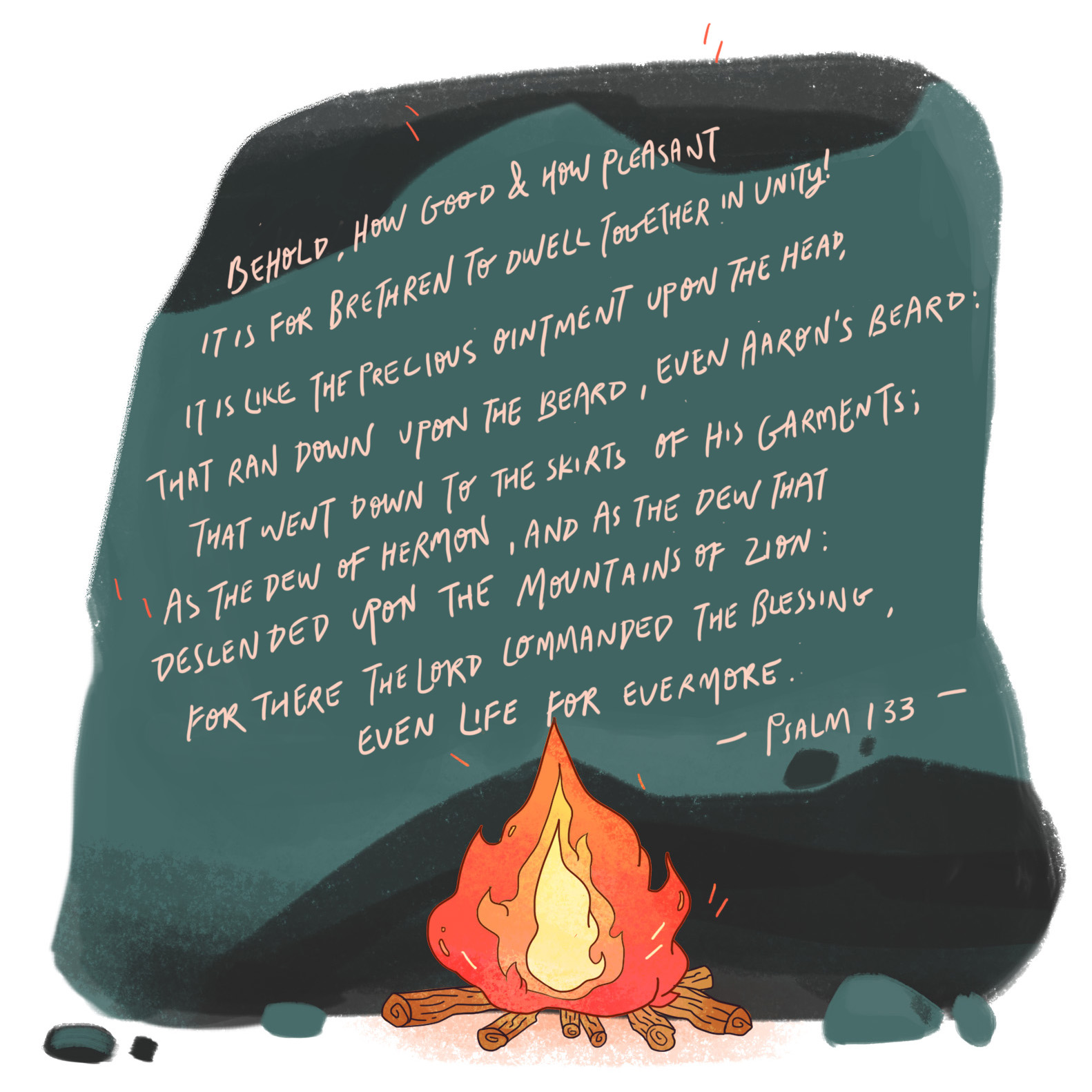
I’m a fan of the New International Version (NIV) translation when it comes to preaching, but I must admit that some of its translations are not the best. One of those places would be Psalm 133.
In the King James Version, the psalm begins with a word which the NIV left out: “Behold”.
“Behold, how good and how pleasant it is for brethren to dwell together in unity!” (Psalm 133:1)
This little word “behold” really brings out the context surrounding this psalm. Why? Because “behold” can literally be translated to “quick look, there’s an extraordinary sight”!
It’s an exclamation and a surprise, and it informs us of this – brethren dwelling in unity is an unusual sight.
Unity in the church must never be taken for granted. It’s a very rare and precious thing.
In fact, when you read through the Bible, you’d find that throughout Israel’s history, not many brothers are friends. Think of Cain and Abel. Jacob and Esau. Joseph and his brothers. Even Jesus and his brothers were not close in the beginning.
But there was one moment in Israel’s history when there was unity. And it was during the reign of King David, the golden age of Israel.
And David declared in his psalm: “Wow! Quick, look! Here are brothers dwelling in unity.” And he goes on to say that it is a good and pleasant thing.
Unity in the church must never be taken for granted. It’s a very rare and precious thing.
So interesting, isn’t it? Because “good” and “pleasant” usually don’t come together. When something is good, it is usually not pleasant. When something is pleasant, it is usually not good.
For example, we tell our children: “eat your vegetables, it’s good for you”, “study hard, it’s good for you” or “take that medicine, it’s good for you”.
However, here is one thing that is good and pleasant: when brothers dwell together in unity. And then, surprisingly, against that motif, David brings up two metaphors in verses two and three that don’t quite gel – oil and water.
There is only one place where oil and water combine naturally – sweat! But what was David looking at to make him think of perspiration?

Remember that Psalm 133 is one of the songs of ascent. These are songs pilgrims would sing as they made their way up to the temple of the Lord on Mount Zion to worship God.
David must have been looking at the pilgrims as they ascended Mount Zion towards the temple of the Lord. They were singing, dancing and celebrating before the Lord in one heart and one spirit as they marched towards the temple. And their faces must have been drenched with sweat.
I think that was what reminded David of the day Aaron was anointed with oil, and the days when he himself was a shepherd boy and would wake up in the desert with his face drenched in dew.
But why was David thrilled by their oneness and unity? I think it’s because he understood that where there is unity, the Lord bestows blessings, even life forevermore (Psalm 133:3b).
And when God’s blessings flow, there is an anointing that flows like the refreshing oil of Aaron. God’s anointing flows like the dew of Hermon and brings life.
Unity attracts the presence of God. Where there is unity, the anointing will flow. So when the church comes together as one, God is thrilled.
In fact, this was what Jesus prayed for us. He only asked for one thing: that the Church will be unified (John 17:20-23). This also means that we are not yet unified.
This unity that Jesus asked for is not organisational but relational. You may ask, what does relational unity look like visibly? One of the best descriptions I can think of is in Philippians.
“Therefore if you have any encouragement from being united with Christ, if any comfort from his love, if any common sharing in the Spirit, if any tenderness and compassion, then make my joy complete by being like-minded, having the same love, being one in spirit and of one mind.” (Philippians 2:1-2)
The Apostle Paul goes on to outline four essential ingredients for unity. When these four things are missing, there is no authentic unity. We can go through the form, but there will be no power.

1. BEING UNITED IN CHRIST
When like-minded believers gather together, even though we may be strangers from different backgrounds, we immediately find a sense of connectedness.
And that is because we are one in the Lord. It’s not natural. It’s supernatural. We find courage in our oneness through Christ.
2. DRAWING COMFORT FROM HIS LOVE
We love one another because we know we are first loved by God (1 John 4:19). This is the love of God that is shared in all our hearts by our Holy Spirit. So it’s not just about human affinity – whether we like each other or not.
It’s the God kind of love that says: “I love you not because you’re beautiful. You’re beautiful because I love you”.
3. ENJOYING FELLOWSHIP IN THE SPIRIT
This word “fellowship” in Greek is the word koinonia. It is actually a very deep word used to describe Siamese twins who are inseparable. It tells us that we are so connected that if we separate, we would die.
This also means that there is no room for independence in the body of Christ. We need one another. I cannot live without you, you cannot live without me. That’s why we do not compete but complete one another.
Friendship is when we sit around the same table and drink soup out of our own bowls. But koinonia is where everyone drinks out of the same bowl. That’s how deep fellowship is.
4. HAVING TENDERNESS AND COMPASSION
We can have different viewpoints, practices and even doctrinal differences. But when we deal with one another sensitively and tenderly, and genuinely care for one another, our unity becomes tangible and visible.

Paul goes on to talk about two great obstacles to such unity: self-importance and self-interest.
The moment we think we’re better, unity is hindered. If we think our worship is more dynamic, our teaching is more solid, our fellowship is more authentic, then we have lost the plot. We have become competitive and not cooperative.
And if our attitude towards coming together is, “what’s in it for me?”, then we will never come to oneness. We will end up looking after our own turf, ministry and territory.
So how do we eradicate self-interest and self-importance? The key is in Philippians 2:5. We should have the same attitude as Christ Jesus.
When there is true unity in the Church, there will be salvation in the world.
This is another place where the NIV translation is a little inadequate. The NIV translation gives us the impression that Jesus is an example for us to imitate.
But the truth is we cannot imitate Christ by our own efforts. So the key is not imitation but incarnation. Jesus is not just an example for us but also our enabler.
It is not me trying to be Christlike but it’s Christ in me, the hope of glory (Colossians 1:27). Our job is not to try to imitate Him but allow the incarnate Christ to manifest Himself through us. That is the key.
And even though the body of Christ is not fully united yet, I’m convinced ultimately that the body of Christ will become one as Jesus and the Father are one. Because God will answer the cry of Jesus.
But remember, the purpose of unity is not for unity itself. When we are united, the world will see the gospel in action (John 17:20-23). When there is true unity in the Church, there will be salvation in the world.
- How united do you think your church community (cell group, ministry, etc) is?
- In your view, what are the obstacles to unity?
- What is one way you can encourage unity in your spiritual community this week?









